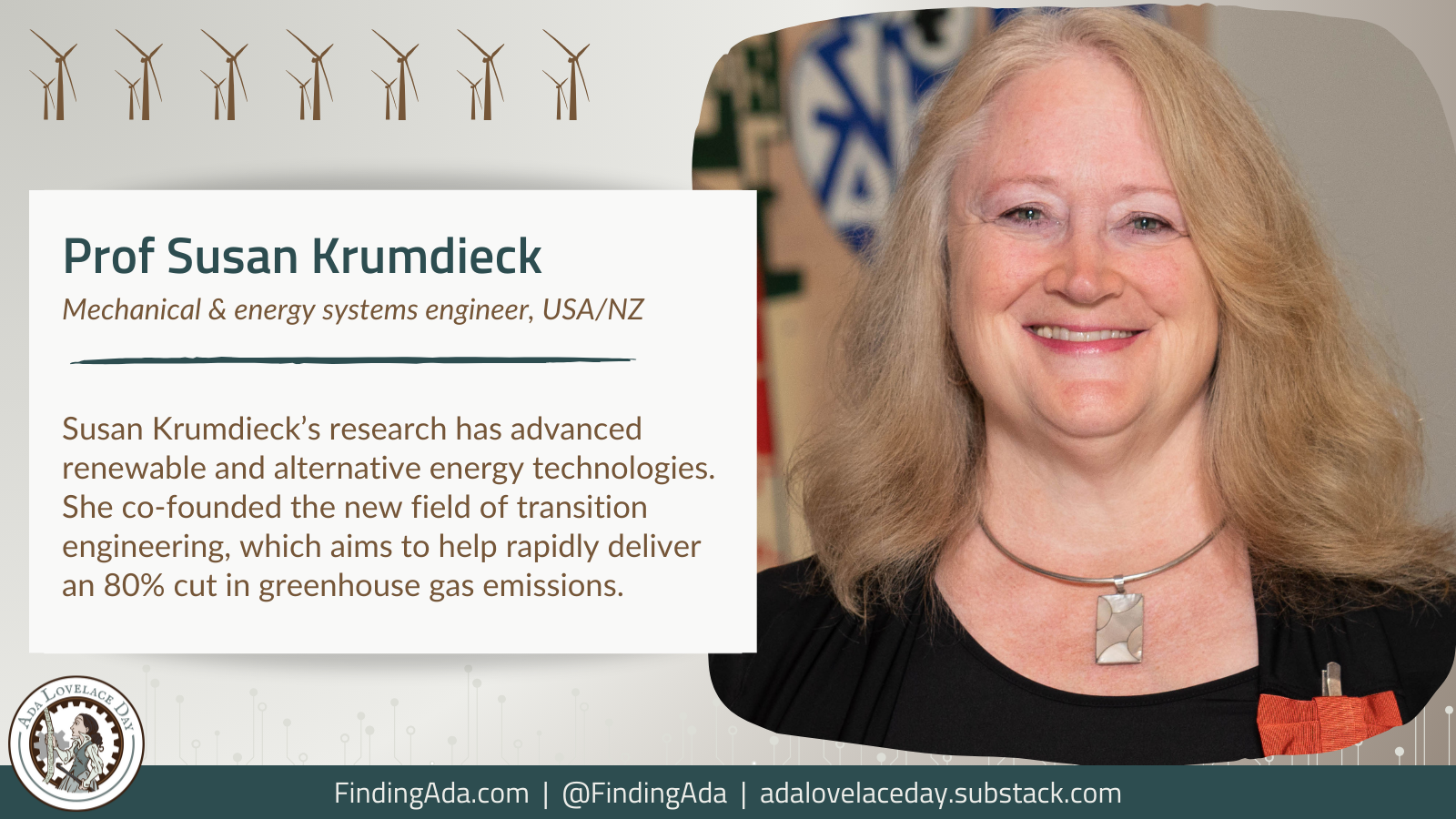Professor Susan Krumdiek
Professor Susan Pran Krumdieck is a mechanical and energy systems engineer, academic and international expert in energy transition research. Renowned for her forward-thinking work on sustainability, she is the co-founder of the transition engineering movement. This new discipline sees engineers developing innovative methods and technologies to help the world adapt to rapidly reduced fossil fuel production and consumption.
Krumdieck grew up in Colorado and initially dreamed of becoming an archeologist. The seeds for her later career were sown in the 1970s, when an energy crisis hit the U.S. and she noticed how people in rural areas seemed to adapt to scarcity relatively easily. She pursued engineering as a way of following her interest in energy systems, obtaining her PhD in mechanical engineering from the University of Colorado at Boulder.
In 2000, Krumdieck began lecturing in mechanical engineering at the University of Canterbury, Christchurch, New Zealand. She rose to full professor in 2014, the first woman to hold the position, and served as director of the university’s influential Advanced Energy and Material Systems Lab (AEMSLab). Here, her team worked on energy transition, including creating new materials to address specific energy problems.
Krumdieck spent 20 years at the University of Canterbury, becoming an expert in developing new ideas for dealing with oil supply issues. More broadly, her research has advanced renewable and alternative energy technology. The term “transition engineering” was first used in 2010 to describe the approach to sustainable energy Krumdieck and her team were pioneering in New Zealand, which was concerned with how engineering could enable a rapid downshift in fossil fuel use.
Krumdieck’s work in this emerging field has included spearheading the launch of the Global Association for Transition Engineering (GATE), a charitable organisation made up of engineering professionals and academics. In 2015, she ran a course on transition engineering at the Grenoble Institute of Technology in France, which led to the opening of the world’s first transition school. Four years later, she published Transition Engineering: Building a Sustainable Future. This book provides a seven-step methodology that governments, industries and communities can adapt to respond to issues such as climate change, decline in conventional oil supply and local environmental constraints.
The ultimate aim of transition engineering is to help rapidly deliver the COP21 Paris Agreement requirement of an 80 per cent cut in greenhouse gas production. It seeks to do this through projects in industry and the public sector – spanning transportation, housing, commercial buildings, consumer products, air travel, agriculture and energy use. But transition engineers have other goals, too – including, in Krumdieck’s words, “realising social benefits and making profits”.
In 2020, Krumdieck left New Zealand to become a professor and Chair of Energy Transition Engineering at Heriot-Watt University in Scotland, a role in which she is developing an energy transition project on the Orkney Islands. Over the course of her career, Krumdieck has published over 130 peer-reviewed papers, supervised 21 PhD student completions, and been awarded over $7M in research grants as principal investigator.
She was appointed an honorary Member of the New Zealand Order of Merit for services to sustainability research and engineering in 2021, and is a Member of the Royal Society of New Zealand. She has said her dream project is to apply the transition engineering methodology to a major oil company, adding: “Ingenuity, resourcefulness and creativity are the best resources for achieving change.”
You can follow her work here:
Twitter: @DrSKrumdieck
Further Reading
- Susan Krumdieck, Wikipedia
- Professor Susan Krumdieck, Transition Engineering
- Heriot-Watt University Launches Energy Transition Focused Program, Paul Anderson, Rigzone, 10 August 2023
- Dr. Susan Krumdieck: Dedicating Her Energy to Engineering Solutions to Fuel Our Future, People Behind The Science Podcast, 29 August 2022
- ‘Sustainability is wishful thinking’: get ready for the energy downshift, John McCrone, Stuff, 14 November 2020
- Five Minutes with Professor Susan Krumdieck, Kavita Kansara, Engineering New Zealand, 29 September 2020
- Introducing “Transition Engineering”: A Bold New Approach To The Climate Crisis, Energy, Environment and Sustainability Group, Professional Engineering magazine, 27 April 2020
- Climate Change: How To Stop The Titanic, Susan Krumdieck, The Possible, November 2016
Written by Moya Crockett, with thanks to Stylist for their support.
